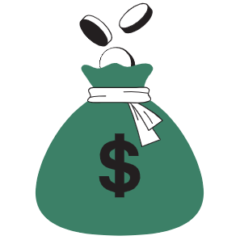Steve Jobs and Steve Wozniak co-founded Apple. We all know that.
What many do not know is that there was a third co-founder. His name was Ronald Wayne. The reason we do not know much about him is because he quit just two weeks after the company was formed. He then sold his 10 percent stake in Apple for a mere 800 dollars. Had he not sold…well, we know the story.
But then consider his situation at the time. He had bills to pay and a family to support. Being around and working on an unproven product in a scrappy startup was not the ideal of stability, at least for him.
When asked about “why he quit” decades later, he said that he made the best decision with the information he had at the time.
And that was the right response. It had to be.
We can do Monday morning quarterbacking all day long but that is the right way to approach decision making in scenarios like these and many others we face in our lives.
On a tangentially different note, say you come into a windfall, planned or unplanned, and that windfall is enough to cover your living expenses. The windfall could be an outcome of a startup you had a stake in that IPOed at an unfathomable price.
Or an accidental stock pick which you then forgot about and which later turned into a goldmine that gave you that lottery-like outcome. Whatever the case maybe, you now have a decision to make. What should you do? Money wise, you are done with the slaving.
And if you are done, if you’ve won the game, why keep playing? Yes, more money would be nice but if that comes with risks that could make you go back to slaving, that is no good.
When you’ve won the game, it is not just money that is at stake. It is time. It is freedom to do what you really aspired to do with this one precious thing called life. That is at stake. What else would you be doing with your time is at stake if money were no longer an issue.
So how do you know if you’ve won the game with that planned or unplanned windfall? Unplanned windfall is the lottery-like outcome we talked about, but a planned windfall is the slow accumulation of wealth that we all do so technically not a windfall.
But from the financial planning perspective of winning the game, the math is the same.
We’ve all heard of the four percent rule. That is, if you can cover your yearly living expenses on four percent of your money, you are technically done. You’ve won the game. Because if you’ve designed your life and your money right, you in theory will never run out.
But that was the old rule that came about when yields on super-safe Treasury bonds were six percent. At today’s rates and market valuations, I would revise that four percent rule to a three percent rule.
But if you want to make it literal bulletproof, I would shoot for a two percent rule. That is a target net worth goal of 50 times your annual living expenses. So, if you spend say $50,000 a year, you will need to save up to a $2.5 million portfolio.
That appears tough but doable assuming you are not starting from scratch and you have a reasonably long runway.
The biggest hurdle though in trying to win this game is not numbers. It is you and me. Because as Morgan Housel, a writer and a storyteller par excellence says, the hardest and the most important financial skill is getting the goalpost to stop moving. And that is a skill most cannot master.
But if you can get that goalpost from not moving, you are done. Not done working but done working on somebody else’s terms. That is the essence of financial independence.
So, some takeaways…
- Blindly chasing returns without weighing risks is what’ll get you into a heap of trouble. Your life situation is unique to you. Your financial plan and the portfolio that feeds into that plan hence, should match that uniqueness. Just because your neighbor does some random thing with his savings does not mean you have to do it.
- And your expenses are everything. Do not let them creep up more than they need to because that independence that you so desire might not ever come, no matter how much money you have.
Thank you for your time.
Cover image credit – Vlad Chețan, Pexels

